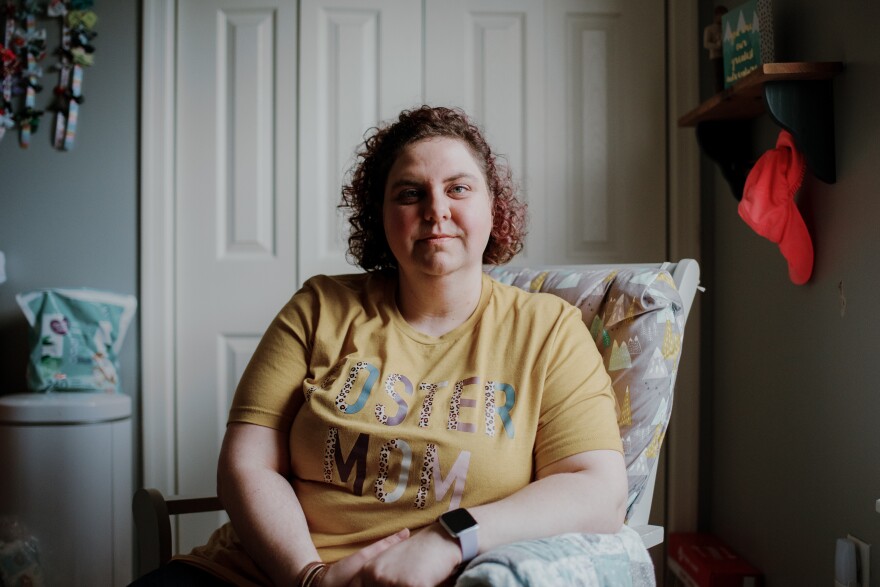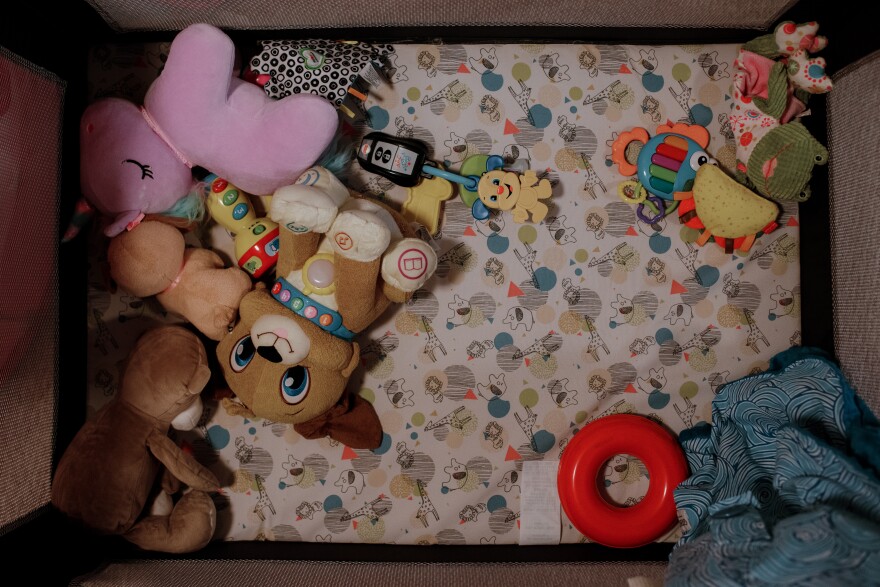LISTEN: Will Hoge Has The Mountain Stage Song Of The Week
On this week's premiere broadcast of Mountain Stage, host Kathy Mattea welcomes Dave Alvin & Jimmie Dale Gi...
Continue Reading Take Me to More News

This story was originally published by Mountain State Spotlight. Get stories like this delivered to your email inbox once a week; sign up for the free newsletter at https://mountainstatespotlight.org/newsletter
For Sara Gordon, becoming a foster parent felt like a calling as early as high school.
She remembers the little girl in her mom’s pre-K classroom, crying and wearing tattered clothes. One time the child came in with a broken eardrum. Every time Gordon visited she seemed to possess an ability to calm her.
She dreamed of becoming a foster mother.
“I have always felt like I was supposed to help kids in the system,” she said.

Now in her 30s, that’s what she’s been doing. Gordon and her husband, Andrew, have welcomed eight foster kids into their home in a quiet Martinsburg neighborhood over the last three years.
They say the experience has been enriching.
But they also describe a long list of unexpected hurdles linked to the state’s foster care bureaucracy: administrator errors and communication problems, and a feeling that they just haven’t gotten the support they need from the state agency charged with making foster care work for West Virginia’s kids.
Experts at every level of the child welfare system know kids best thrive in a family environment, with a relative or foster home close to their community, instead of an institution or facility.
Recruiters looking for foster families in West Virginia spend tens of thousands of dollars, and log as many miles each year, hoping their efforts will lead them to people like the Gordons: stable, loving, and devoted — no matter how long or short the child’s stay.
At a critical time for West Virginia’s foster care system, the state faces two key shortages: It doesn’t have enough Child Protective Service workers, the employees responsible for checking on the safety and well being of the kids. And there aren’t enough foster families. For kids, that can mean landing in foster homes or facilities hours away from their home communities, because closer placements have filled up.
“Placing children close to their home community, when possible, can lessen the disruption to their daily routine and can allow them to retain connections with friends, school” and important people in their life, said Beth Cook, a longtime social worker based in Logan County.
Other states are grappling with similar shortages. But with nearly a fifth of West Virginia children living in poverty and more of its kids affected by opioids than any other state, the foster care deficits here are all the more urgent.
State struggles to recruit foster families
West Virginia has the highest number of kids in foster care per capita of any other state, according to the Annie E. Casey Foundation. The mix of arrangements includes foster family homes, emergency shelters, group homes or institutions in and out of state, and kinship care, in which a grandparent or other relative is raising the child. Nearly two-thirds of the kids are 10 or younger. More than half entered the system because of a parent’s substance abuse.
Advocates say there’s a geographic need: several counties in the state have five or fewer certified foster homes. There’s an even bigger need for families who will take older kids, sibling groups and kids with special needs.

“When the demand is so high we’re just trying to get these kiddos into safe loving homes where we can start working with them on their trauma,” said Amy Kennedy-Rickman, executive director at Necco, a private agency paid to help the state place kids.
Finding suitable foster families is one of the responsibilities the state has partially turned over to private foster care-placing agencies in recent years. One of them is Necco; Kennedy-Rickman says the agency spends tens of thousands of dollars each year in recruitment efforts alone, including billboards and signs along the side of the road in high-need areas across the state. Recruiters have suggested a number of other ideas for how to enlist more families, from advertising on restaurant placemats to printing slogans on bookmarks, pencils, balloons, key chains or T-shirts.
But word of mouth is among the most effective strategies. And the state Department of Health and Human Resources says in order to get foster families to recommend others consider the same path, they need to be happy with the experience.
“Parents need to be rewarded, respected, and most of all, their opinions need to be heard and valued,” the state’s “homefinding” policy says. “A family that has been pleased with the service it received from the Department will let others know of their positive experience.”
But even some West Virginians who want to be foster parents, like the Gordons, have been turned off by their experiences with both their former private foster placement agency and DHHR.

On the wall of their younger foster daughter’s bedroom, the Gordons have a print of a tree with multi-colored thumbprints of all eight kids they have fostered since 2018 on the branches. The other side lists their names, the day they arrived and the day they left.
“When I walk in here, I see all my kids,” Sara Gordon said. “This is a way for all of us to be together in one place. I wanted to be able to just have something that symbolizes family.”
But while the thumbprint tree documents the kids’ stay with the Gordons, it’s also a painful reminder of what went wrong.
“Every time you look at it,” she said, “you think the system failed.”
That’s because while the ultimate goal for the state is to reunite foster kids with their biological families, that’s not the reason these kids left the Gordons.
One foster child kept on calling the Gordons even after leaving, because their new placement wasn’t explained. One had a diagnosed mental health condition, but arrived with no medicine. Another spent six months with the Gordons on a waitlist for mental health care, but left for another foster home, then returned and had to start over on the list.
The Gordons say one of the most troubling aspects of the system is that while the state technically had custody of their most recent foster daughters, the state-employed social worker assigned to check in on them didn’t get in touch for eight months. They had their two foster daughters for a year and only had a single visit from the girls’ Child Protective Services worker.
Lack of support
DHHR’s own employees have documented communication problems between agency workers and foster parents. In her first report in the newly-created position of foster care ombudsman, Pamela Woodman-Kaehler found that “communication complaints are pervasive.” Those include foster parents, attorneys and biological parents saying Child Protective Services workers won’t call or text them back, and reports of CPS workers not delivering on promised visits and resources.

These findings are supported by a 2019 survey from the WV Foster, Adoptive, & Kinship Parents Network.
Working with DHHR and Marshall University, the group surveyed more than 1,000 foster parents. When asked how often DHHR caseworkers visit the children in their care, more than 40% said every three months or less often.
DHHR is required to visit kids in its care monthly under its own policy. And the agency’s literature talks about the importance of these visits.
“Regular contact between the child who is in foster care and the child’s worker allows the child to have ample opportunity to express concerns, fears, problems with the placement, or other special issues,” DHHR’s policy says. “These meetings also provide the child’s worker with an opportunity to discuss the child’s case plan and services being provided, and to directly assess the child’s progress.”
If there’s a private agency involved, DHHR can count some of that agency’s visits as their own. That’s what happened in the Gordon family’s case, where a private caseworker that matched the children with the family visited twice a month. But that person’s role is often different, and a state-employed CPS worker still has to call the foster child at least once a month and have some face-to-face contact every three months.
DHHR declined multiple interview requests for this story; in an emailed response, spokeswoman Jessica Holstein said she was unable to comment on specific cases, but reiterated the agency’s mission of promoting “the health and well-being of West Virginia residents, especially for vulnerable residents such as children.”
The survey results from the WV Foster, Adoptive, & Kinship Parents Network suggest that private foster care agency workers are filling in the gaps; of foster parents who had a private agency worker assigned to them, more than 90% reported monthly visits — and three-quarters said they saw the private workers twice a month or even more frequently.
But Sam Hickman, who retired last month as director of the West Virginia chapter of the National Association of Social Workers, says these private agencies aren’t a sufficient substitute for state worker visits because they play different roles.
“The state has this awesome responsibility for the well-being of the child because they’re in the state’s custody,” he said.
DHHR is “making the decisions as to what’s best for the children,” Sara Gordon said, even when and where they should go to the doctor.
“It’s hard and it’s infuriating to have people make decisions who have never even seen the kids,” she said.
Private agency social workers have limited access to information and are often unable to tell the foster family details of the child’s case, such as when a court hearing is scheduled, said Marissa Sanders of the WV Foster, Adoptive, & Kinship Parents Network. And they can’t approve medical procedures.
“If the family or agency worker can’t reach the [CPS] worker, this can cause serious problems. In an emergency situation the medical professionals can still act, but if it’s anything short of a life-threatening emergency, families and children have to wait to get authorization,” Sanders said.
In 2016, Sanders said she waited four months to get her foster child approved for dental work that involved anesthesia.
“We ended up going all the way to the commissioner since we couldn’t reach the worker or supervisor,” she said.
Notably, many foster families, mostly those doing kinship care, don’t go through a private agency. And those kids are the majority: More than half of West Virginia’s foster kids live in kinship placements with relatives.
Across three years of fostering, the Gordons said they had little meaningful interaction with the state-employed CPS workers assigned to their children.
The worker never called or visited the first kids the Gordons fostered, but did ask someone from the local DHHR office to stop in and check on them once, Sara Gordon said. They got a new worker eventually, a change they only learned about when his business card came attached to a letter about an upcoming meeting; that worker did visit shortly before the kids went to kinship care. Subsequently, the worker assigned to a later foster child visited only once for about 10 minutes, she said.
Sam Wiles, a foster parent in Preston County, has made similar observations about absentee CPS workers. She and her husband began fostering in late 2019 and now have five children, including two biological kids, one foster child and two they adopted out of foster care.
Two of her foster children “have a whole new life because DHHR did their job the right way,” she said. But sometimes “DHHR has bad days, DHHR makes bad choices.”
“You have peace knowing that a CPS worker is hopefully removing a child from an unsafe environment,” instead of doing the required visits to her home, she said.
Sara Gordon says the accountability should ultimately rest with DHHR, but she also put it plainly: “The way I look at it is, if I didn’t do my job I would be fired.”
WV continues to grapple with CPS worker shortage
Sanders said staffing shortages are a primary reason families aren’t seeing CPS workers as often as they should.
“In general there is a shortage” of CPS workers, but how many states experience that dearth is unclear, said Christine James-Brown, president and CEO of the Child Welfare League of America. “It’s not a surprise or unusual that West Virginia would be where it is.”
Social workers are overworked and exhausted, James-Brown said, and the ongoing COVID-19 pandemic has complicated logistics.
At the end of June, the percentage of vacant CPS positions was 22%, an increase of 5 percentage points over last year, though retention numbers have improved in recent years. West Virginia CPS workers can cross the border into at least one neighboring state and make thousands of dollars more each year.

Various incentives over the years haven’t helped the state recruit and retain new CPS workers, including reducing the requirement so that anyone with a bachelor’s degree is eligible. Hickman noted that the state hasn’t tried one incentive that he has encouraged, though: paying those specifically with a social work or related degree more money.
DHHR has boosted the pay of CPS workers in the Eastern Panhandle where the agency was losing CPS workers to border states, Sanders said. But, she added, “They certainly haven’t done anything to increase accountability” for when a worker fails to check on a foster child, as in the Gordon family’s case.
The average caseload per CPS worker as of June 30 was 12, according to the agency, a decrease over recent years, though caseloads can vary widely.
In addition to managing their caseloads, CPS workers have another critical duty: investigating child abuse allegations. But according to a 2019 state audit, workers failed to look into half of the reports of child abuse and neglect in the required time frame in 2018.
“According to multiple audits and reviews, CPS has struggled for over 20 years with
meeting statutory time frames for making initial contact with alleged child victims of abuse
and/or neglect,” the audit found.
Earlier this year, lawmakers considered a bill that would allow DHHR to study ways to ensure manageable workloads for CPS workers, as well as reevaluate their salaries and benefits compared to what workers in neighboring states were making. But the bill didn’t make it out of the House before the session ended. Since then, DHHR has said it will study its workforce, and a legislative audit has recommended adopting a new equation to determine how the agency allocates CPS workers around the state.
‘She came in soulless’
The Gordons welcomed their two latest foster daughters, now 16 months and 5 years old, in June 2020. One afternoon in February, Andrew Gordon was practicing flash cards with the older child in the living room as the little one hoisted herself up, nearly taking her first steps.
“What is it? It’s a shape.”
“A diamond!”
“That’s a good try. They’re looking for a triangle.”

A year ago, the older girl, who calls the Gordons “mom” and “dad,” didn’t know her colors, the names of foods, animals, what sounds animals make or how to say or spell her name, Sara Gordon said. The only emotion she recognized was anger. Even playtime used to be rough, and she’d pretend her toys were bleeding and needed to go to the doctor.
“She came in soulless,” Sara Gordon said.
In 2020, state lawmakers voted to create a “bill of rights” for foster children and parents and agreed to pay foster families more money per child, a change Sara Gordon said made her feel “like we have a voice, finally.”
But the pandemic left lawmakers playing catch-up during the 2021 legislative session. In January, just before the start of the session, Delegate Lisa Zukoff, D-Marshall, said she was eager to learn how families were faring under the legislation passed last year. But Zukoff, the minority chair of the Committee on Senior, Children, and Family Issues, said she and her colleagues started the session not having talked about foster care in a year because interim meetings were canceled.
Though she didn’t have specifics, she insisted the state needs to do more when it comes to kinship and foster care.
“If we don’t help these children now we’re gonna be paying for their health care and lack of ability to connect and have decent work for the rest of their lives,” she said.
But lawmakers barely addressed the crisis.
“Definitely foster care was not at the top of the agenda this session,” state Sen. Patricia Rucker, R-Jefferson, said earlier this year. “What we passed last year hasn’t really taken effect.”
Rucker said she’s also heard complaints about foster families not seeing their CPS workers.
“There are just not enough certified social workers in the state of West Virginia,” she said.
The next regular legislative session, set to begin in January 2022, will bring changes to the committee that oversees DHHR. Former chair of the Health and Human Resources Committee Delegate Jeffrey Pack, R-Raleigh, stepped down to head the new Bureau for Social Services. (DHHR split its Bureau of Children and Families in two: this office and the Bureau of Family Assistance.)
But meanwhile, more than 10,500 West Virginia kids had some interaction with the foster care system last year. In Preston County, foster parent Sam Wiles, a licensed practical nurse and nursing student, worries about the trauma kids face by getting involved in the system.
“We’re not supplying the necessary service to kids when they come into care,” she said. “Just the removal itself [is] enough trauma to warrant some behavior specialist.”
Last year, Wiles and her husband agreed to foster three siblings, all under 8, who she said had experienced abuse and witnessed drug use. The siblings are third-generation foster care children, and Wiles wants to break the cycle for them.
“I think our society forgets that this is not just a name on a piece of paper,” she said, her voice breaking. “This is the future generation. These are little people who need lots of help.”
Tomorrow: More than 10,500 West Virginia kids had some contact with the foster care system last year. The state has publicly called it a crisis. But time and time again, the state is failing to adequately fund or run programs that could intervene before kids land in care.